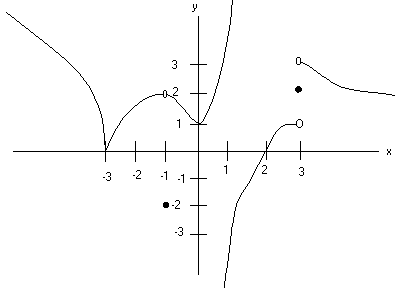Name
MATH 105 PRACTICE
MIDTERM 1
Please work out each of the given
problems. Credit will be based on
the steps that you show towards the final answer.
Show your work.
PROBLEM 1 Please answer the following true or false. If false, explain why or provide a counter example. If true, explain why.
A) (7 Points) If f(x) and g(x) are differentiable functions with
f '(5)
= 10 and g'(5)
= 4
then if
f(x)
h(x) =
- 3g(x)
2
then
h'(5) = -7
True:
h'(x) = (f(x)/2 - 3g(x))'
= f '(x)/2 - 3g '(x)
So that
h'(5) = f '(5)/2 - 3g '(5) = 10/2 - 3(4) = -7
B)
(7 Points) Let
f(x)
and
g(x)
be continuous functions
f(1) > g(1)
and
f(2) < g(2)
then if
h(x) = f(x) - g(x)
h(x)
has a root for some value of x
between 1 and 2.
True:
h(1) = f(1) - g(1) > 0
h(2) = f(2) - g(2) < 0
Hence by the Intermediate Value Theorem, there is a c with h(c) = 0.
C) (7 Points) Let f(x) and g(x) be continuous functions such that
![]() and
and
![]()
Then h(x) has a vertical asymptote at x = 2.
False, Let f(x) = x - 2 and g(x) = x - 2
PROBLEM 2 Find the following limits if they exist:
A) (8 Points)


B) (8 Points)
![]()

C)
(8 Points)
![]()
![]()
PROBLEM 3

A) (8 Points) Find the following limits if they exist
i)
![]() ii)
ii)
![]() iii)
iii)
![]() iv)
iv)
![]() v)
v)
![]()
i) 0 ii) 2 iii) 1 iv) Does Not Exist v) Does Not Exist
B) (8 Points) At which values is f(x) not continuous?
-1, 1, and 3
C) (8
Points) At which values is
f(x) not differentiable?
-3, -1, 1, and 3
PROBLEM 4 (20 Points) Below is the function y = f(x). Sketch a graph of the derivative y = f ’(x).

PROBLEM 5 Find f ' (x) for the following
A)
(10 Points)
![]()
![]()
B)
(11 Points)
![]()
-10x-6 - 2x + 2cosx - 2xsinx + 2cosxsinx + 5/2 x3/2
PROBLEM 6 Let
![]()
A) (10 Points) Use the limit definition of the derivative to find f ’(x).

B)
(10 Points) Prove using the
e-d
definition of the
limit that
![]()
Let e > 0 , choose d = e/2.
|x - 2| < d
implies that
|x - 2| < e/2
so that
|2x - 4| < e
or
|4 - 2x| < e
adding and subtracting two gives
|4 + 2 - 2x - 2| < e
|6 - 2x - 2| < e
Hence
|f(x) - 2| < e
So that that the limit exists.
PROBLEM 7 (20
Points)
The position of a robin flying through the wind is given by
s(t) = -5t + tcost
Find its acceleration when t is 2 seconds.
The acceleration is just the second derivative, so first compute the first derivative.
s '(t) = -5 + cost - tsint
Now the second derivative is the derivative of the derivative:
s ''(t) = (s'(t))' = -sint - sint - tcost = -2sint - tcost
Finally, plug in t = 2 to get
s ''(2) = -2sin2 - 2cos2
which is approximately -1.